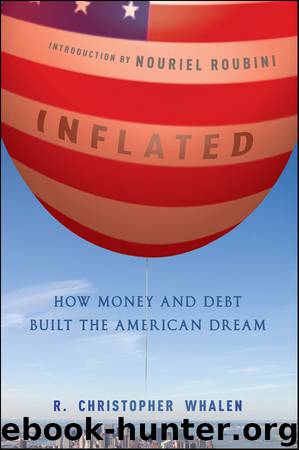Inflated by R. Christopher Whalen

Author:R. Christopher Whalen
Language: eng
Format: epub
Publisher: John Wiley & Sons
Published: 2010-10-28T16:00:00+00:00
FDR and the Era of Broken Precedent
Today the image of FDR in the public mind is larger and more intense than that of Teddy Roosevelt, in part because of the powerful experience of WWII. Arguably Teddy Roosevelt was the larger figure in the long run of historical and political events. The proof of the failure of FDR as an ultimately transformative figure was the lack of any enduring popular movement from grass roots America in response to the New Deal. Both the Republican and Democratic parties had become largely institutionalized. As the 1930s began, already there was ferment among the public in favor of a third, independent party, but none materialized. Of the election in 1932, Minton and Stewart wrote in The Fat Years and the Lean that “the campaign was never more than a contest between Hoover and Roosevelt, between the representative of the political machine in power and the nominee of the political machine wanting power.”2 But the fact remains that FDR was a machine politician as much as was Teddy Roosevelt and had little appeal to real Progressives. In that sense, as men of the left, FDR and Wilson both seem to share an establishment respectability garnished with a veneer of Progressive liberalism.
The members of FDR’s “brain trust” were less revolutionary and more bureaucratic at the end of the day, but many on the left saw him as a “transmitting instrument of the new world order,” according to the Fabian socialist writer H.G. Wells. A devoted socialist, Wells visited FDR on several occasions and called the President and Mrs. Roosevelt “unlimited” people in a sense of their willingness to embrace new, revolutionary ideas.3 His description of FDR recalls the distinction made by author Thomas Sowell regarding people with “unconstrained vision” in his book Conflict of Visions.4
Whereas Herbert Hoover was seemingly a man with constrained vision, who saw human nature as comprised of fixed values and characteristics, FDR instead acted like a man of unconstrained visions, a gambler and opportunist, who used the promise of transformation and the pretense of concern for his fellow man to make seemingly radical changes in society. These changes were largely comprised of calculated political expediencies rather than deliberately chosen and visionary departures from past practice. Like most Republicans, Hoover saw the world as comprised of immutable rules and values that were to be cherished and defended. FDR seemed to see those very same rules as factors to be manipulated and, when convenient, violated, to achieve a larger end.
Contemporary observers such as Eliot Janeway differ with the conservative demonization of FDR. Janeway, who began his writing career at the age of 24, wrote a series of articles for The Nation predicting the 1937–1938 recession. In his first book, The Struggle for Survival, Janeway argued that Roosevelt had no strong view of theoretical political distinctions or economic systems:
Roosevelt was no more a radical than was Queen Elizabeth. Never was a political free-booter more cynical about all theories . . . Temperamentally, the man could not bring himself to believe that good administration ever accomplished or prevented anything.
Download
This site does not store any files on its server. We only index and link to content provided by other sites. Please contact the content providers to delete copyright contents if any and email us, we'll remove relevant links or contents immediately.
International Integration of the Brazilian Economy by Elias C. Grivoyannis(111061)
The Radium Girls by Kate Moore(12029)
Turbulence by E. J. Noyes(8051)
Nudge - Improving Decisions about Health, Wealth, and Happiness by Thaler Sunstein(7709)
The Black Swan by Nassim Nicholas Taleb(7130)
Rich Dad Poor Dad by Robert T. Kiyosaki(6633)
Pioneering Portfolio Management by David F. Swensen(6301)
Man-made Catastrophes and Risk Information Concealment by Dmitry Chernov & Didier Sornette(6019)
Zero to One by Peter Thiel(5802)
Secrecy World by Jake Bernstein(4753)
Millionaire: The Philanderer, Gambler, and Duelist Who Invented Modern Finance by Janet Gleeson(4478)
The Age of Surveillance Capitalism by Shoshana Zuboff(4293)
Skin in the Game by Nassim Nicholas Taleb(4250)
The Money Culture by Michael Lewis(4207)
Bullshit Jobs by David Graeber(4192)
Skin in the Game: Hidden Asymmetries in Daily Life by Nassim Nicholas Taleb(4007)
The Dhandho Investor by Mohnish Pabrai(3766)
The Wisdom of Finance by Mihir Desai(3748)
Blockchain Basics by Daniel Drescher(3583)
